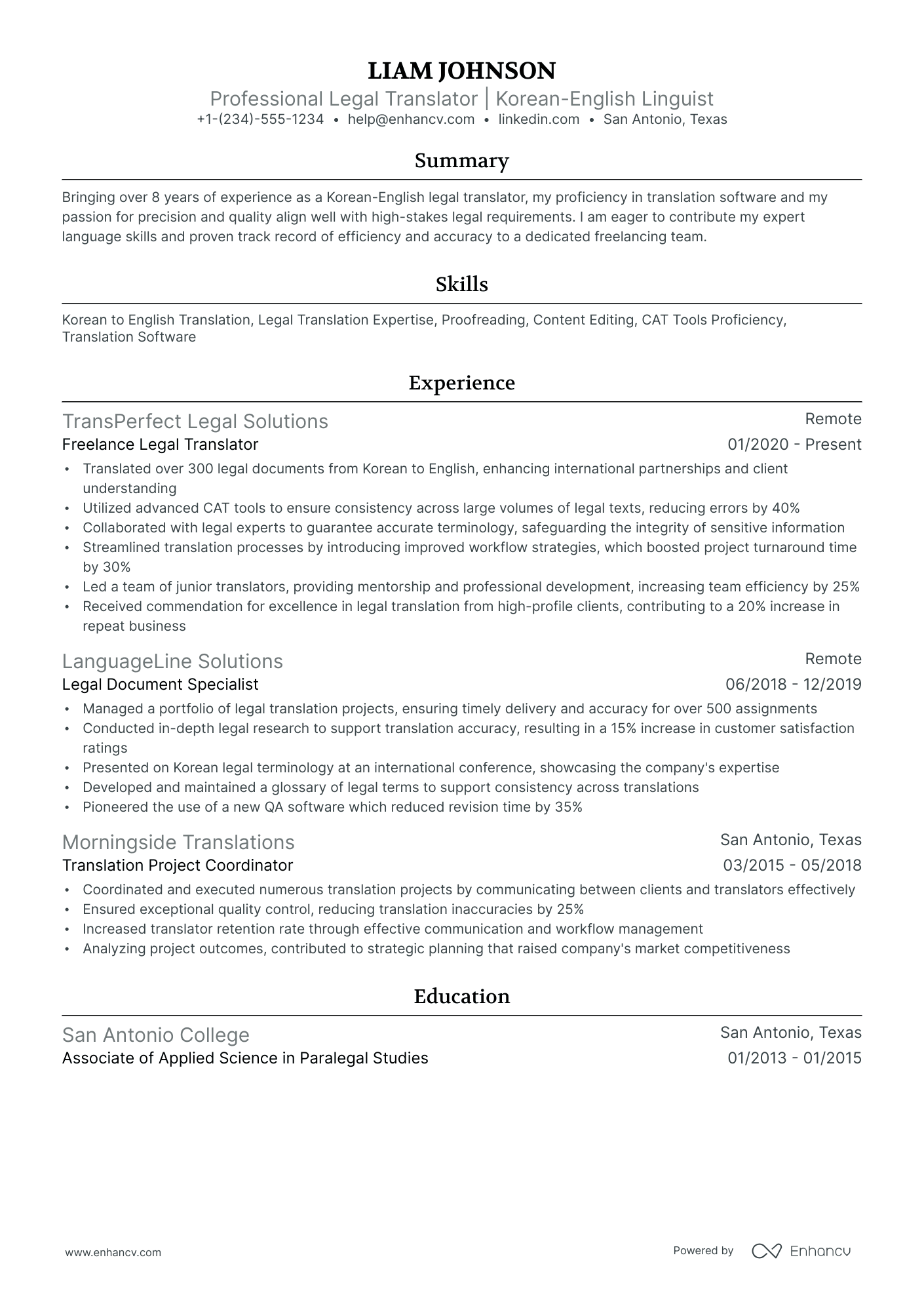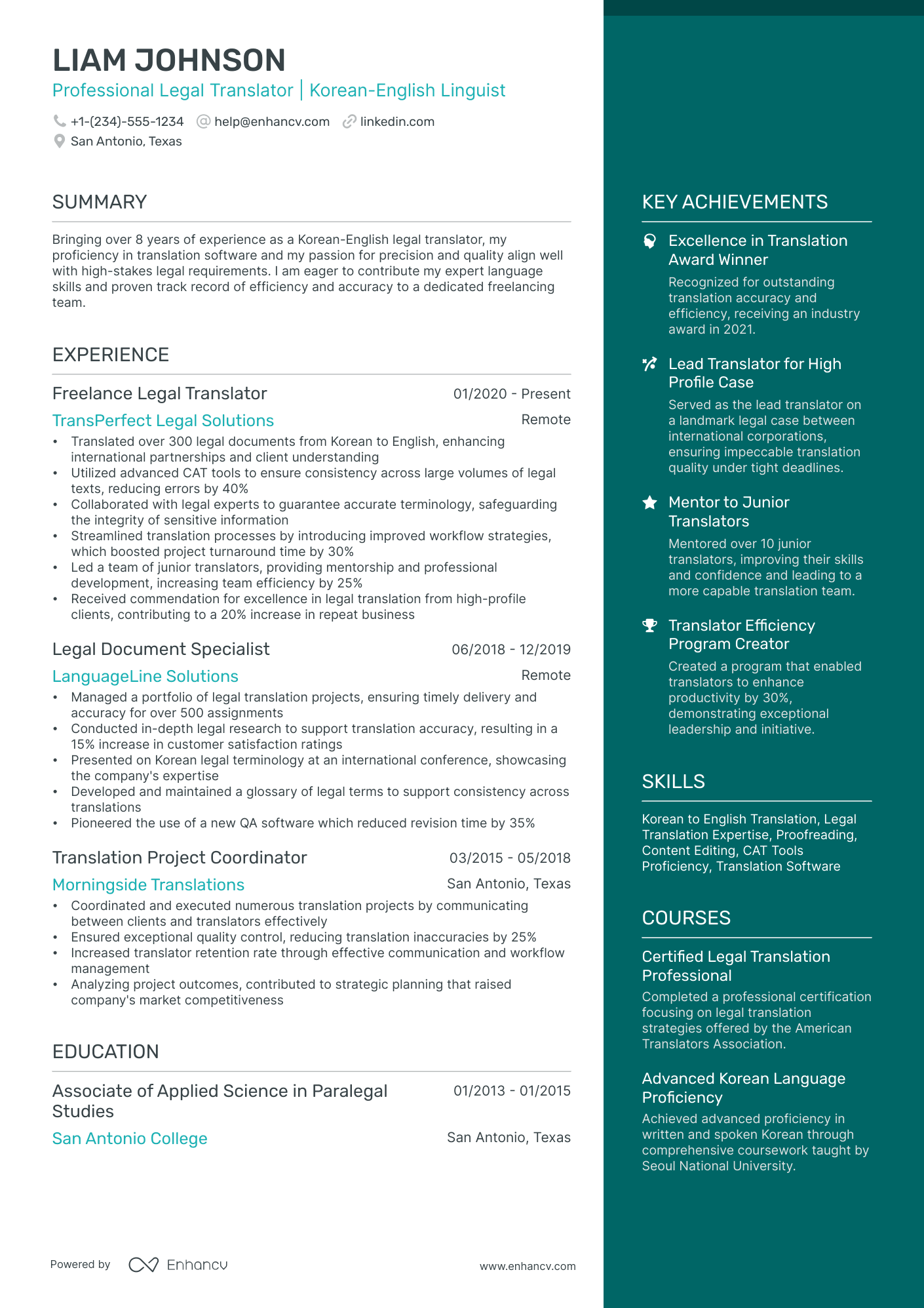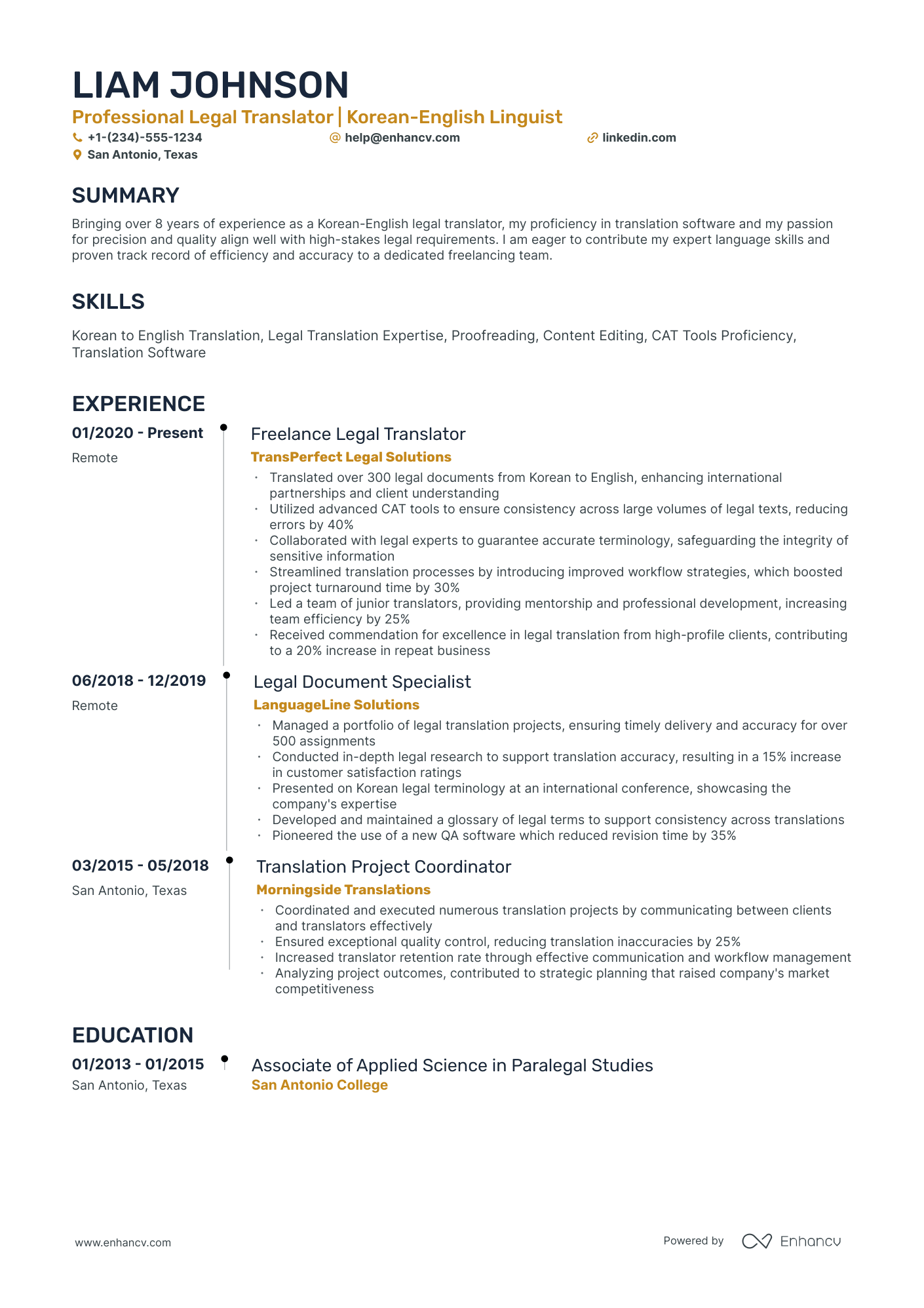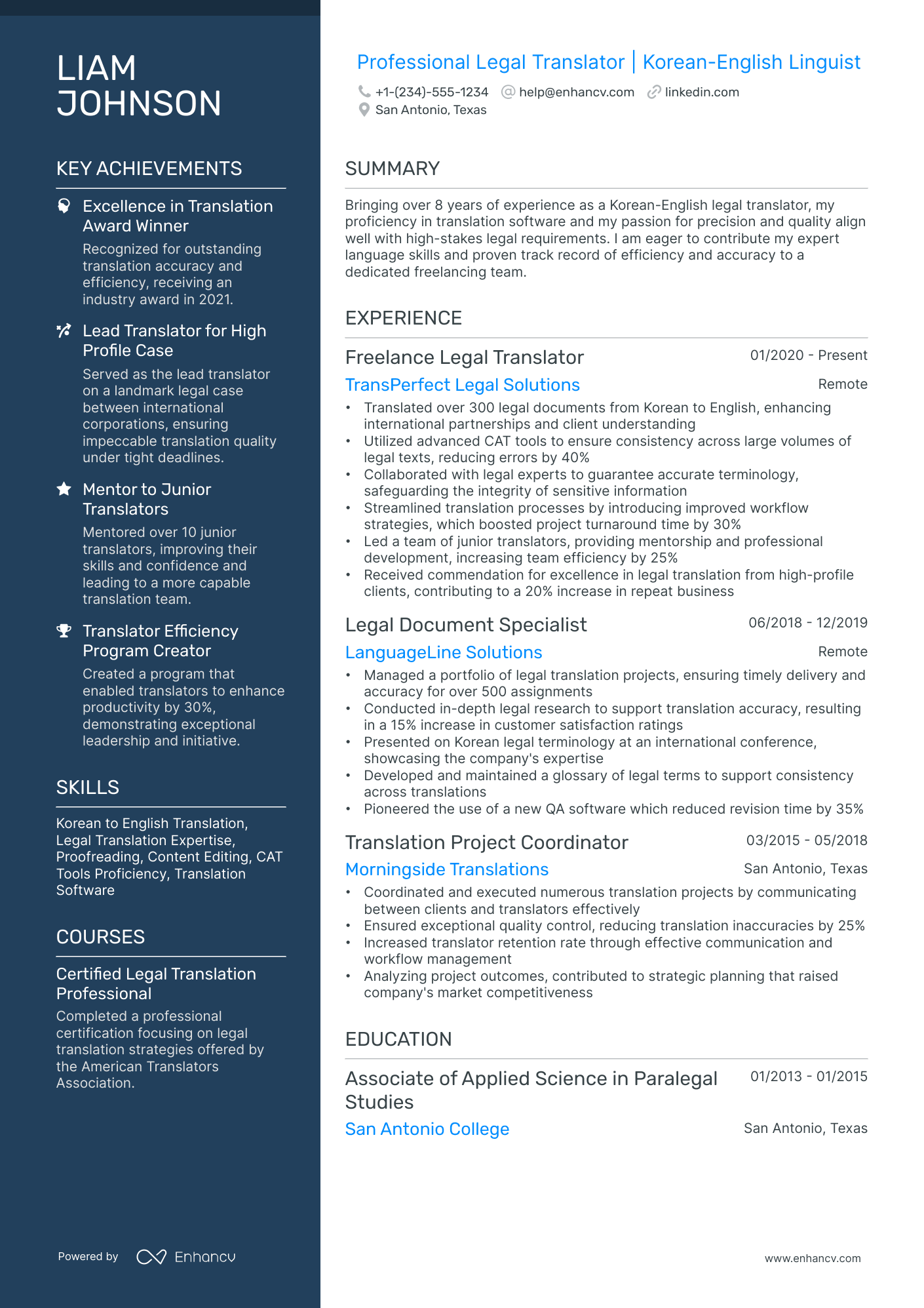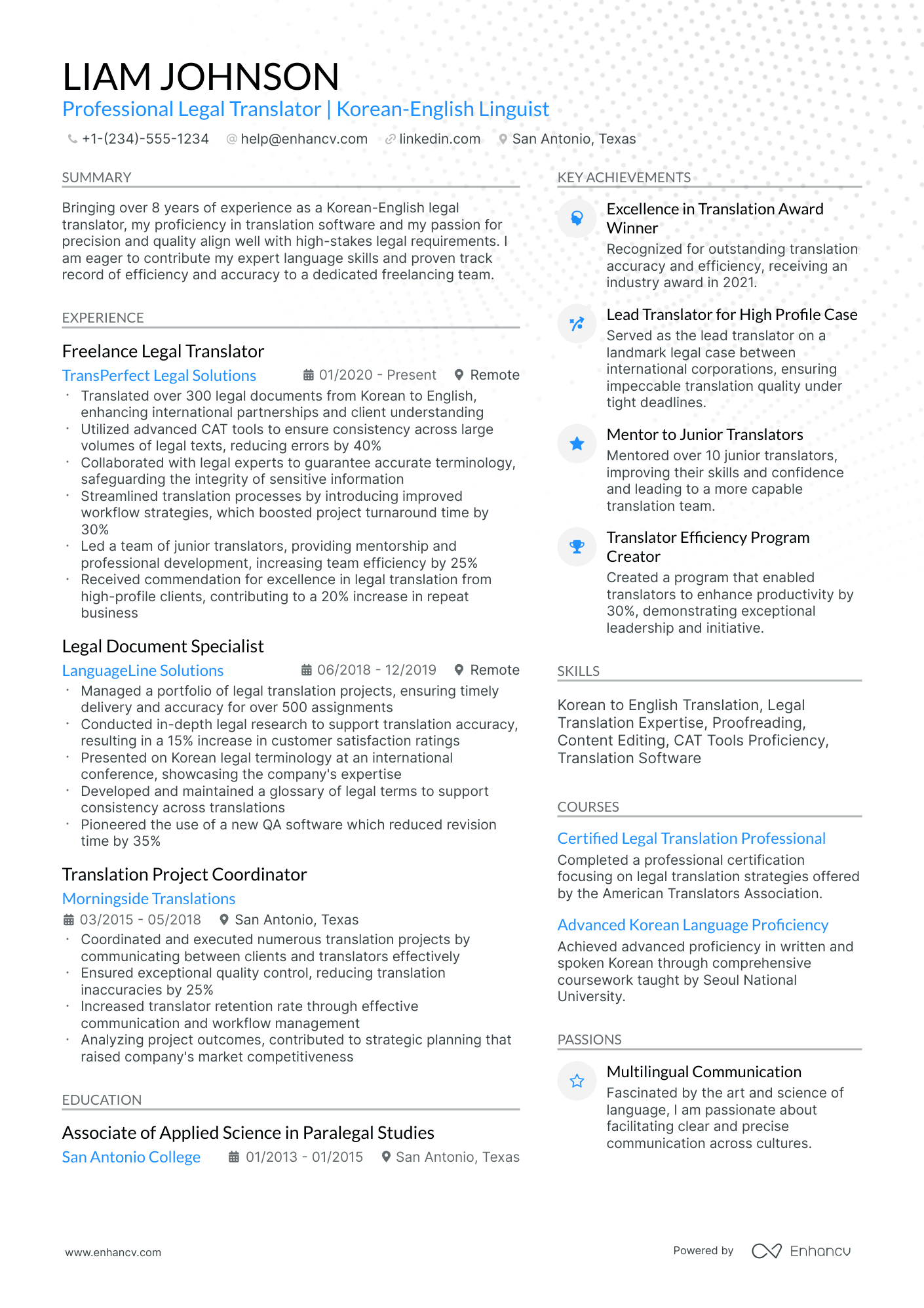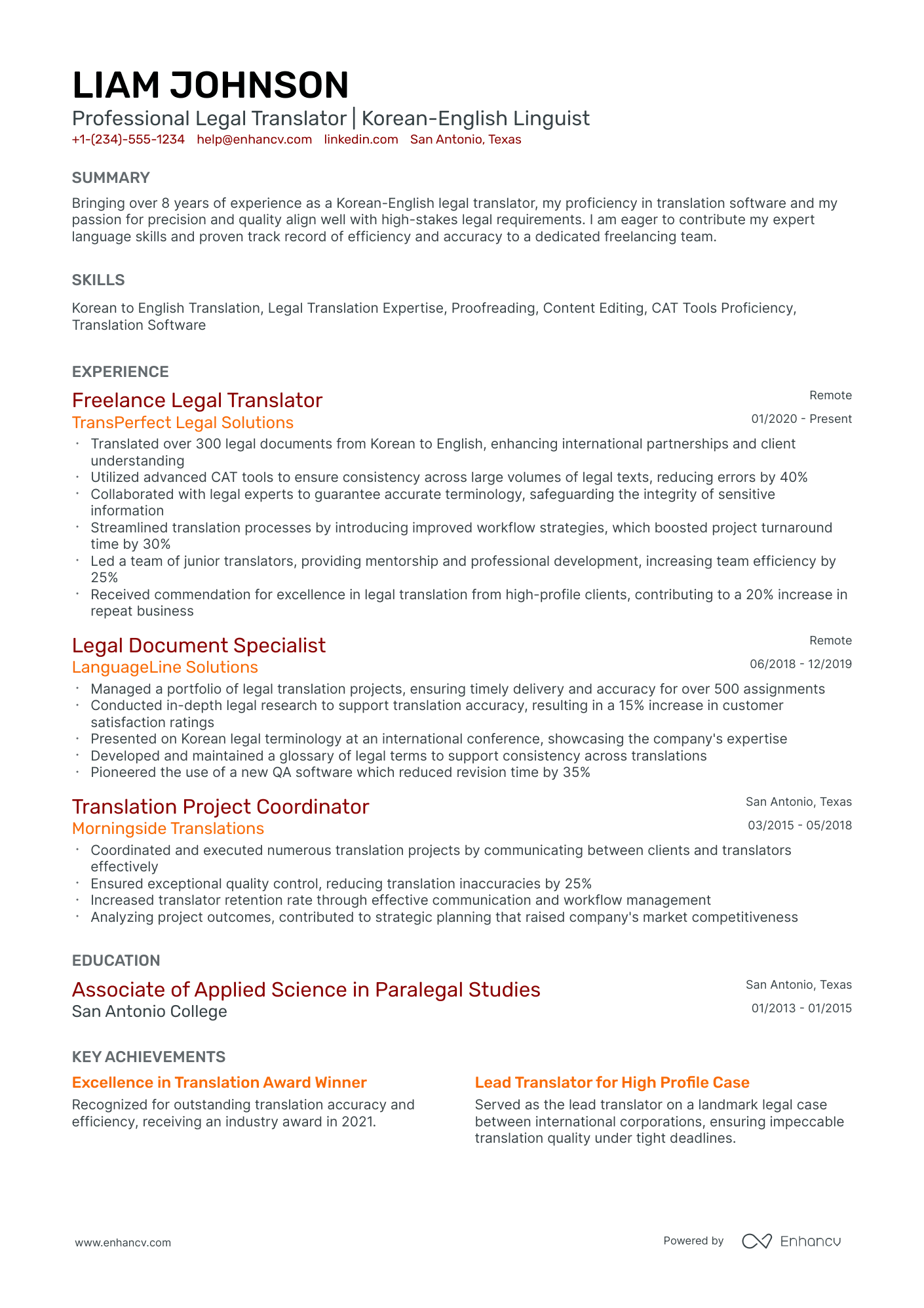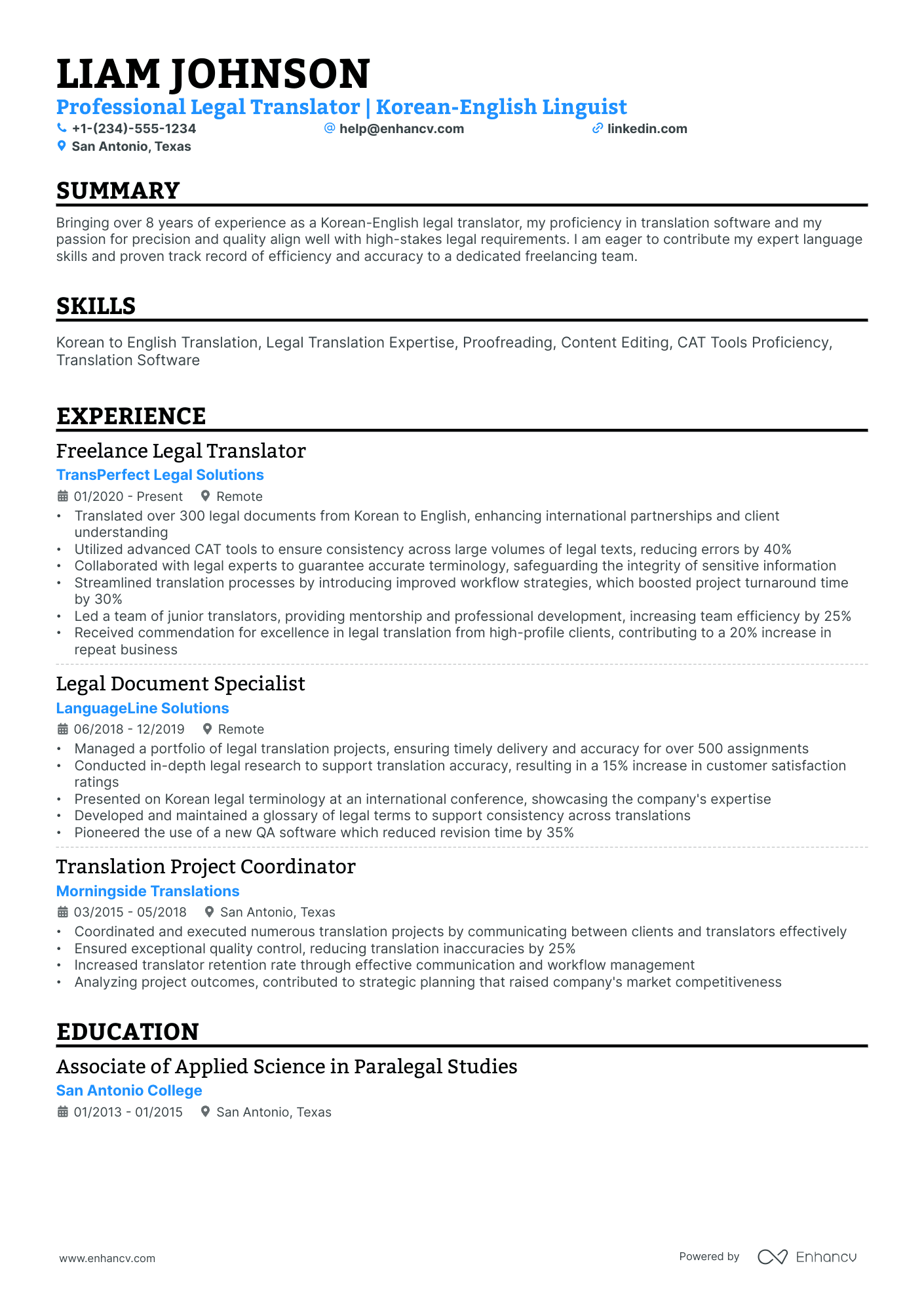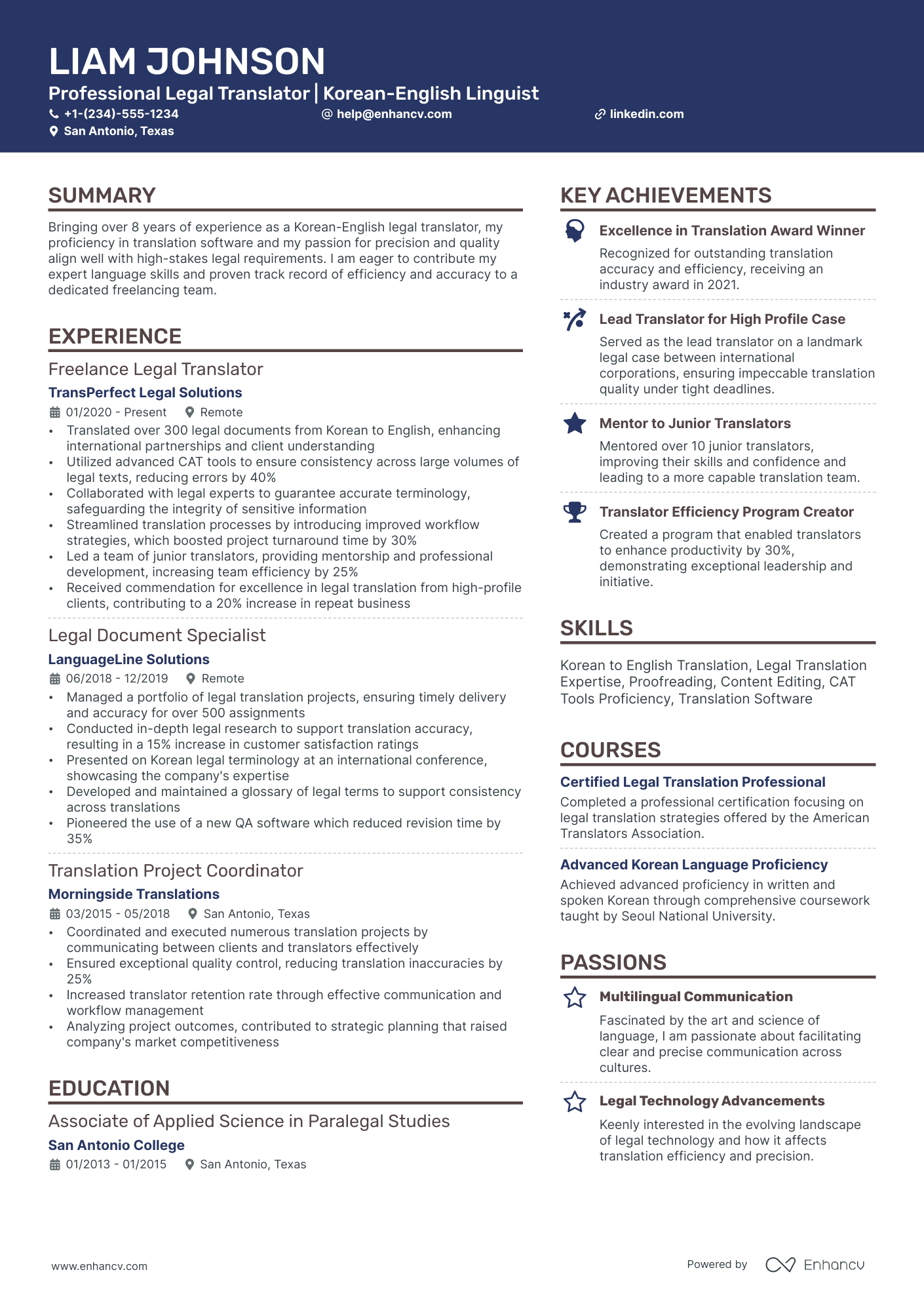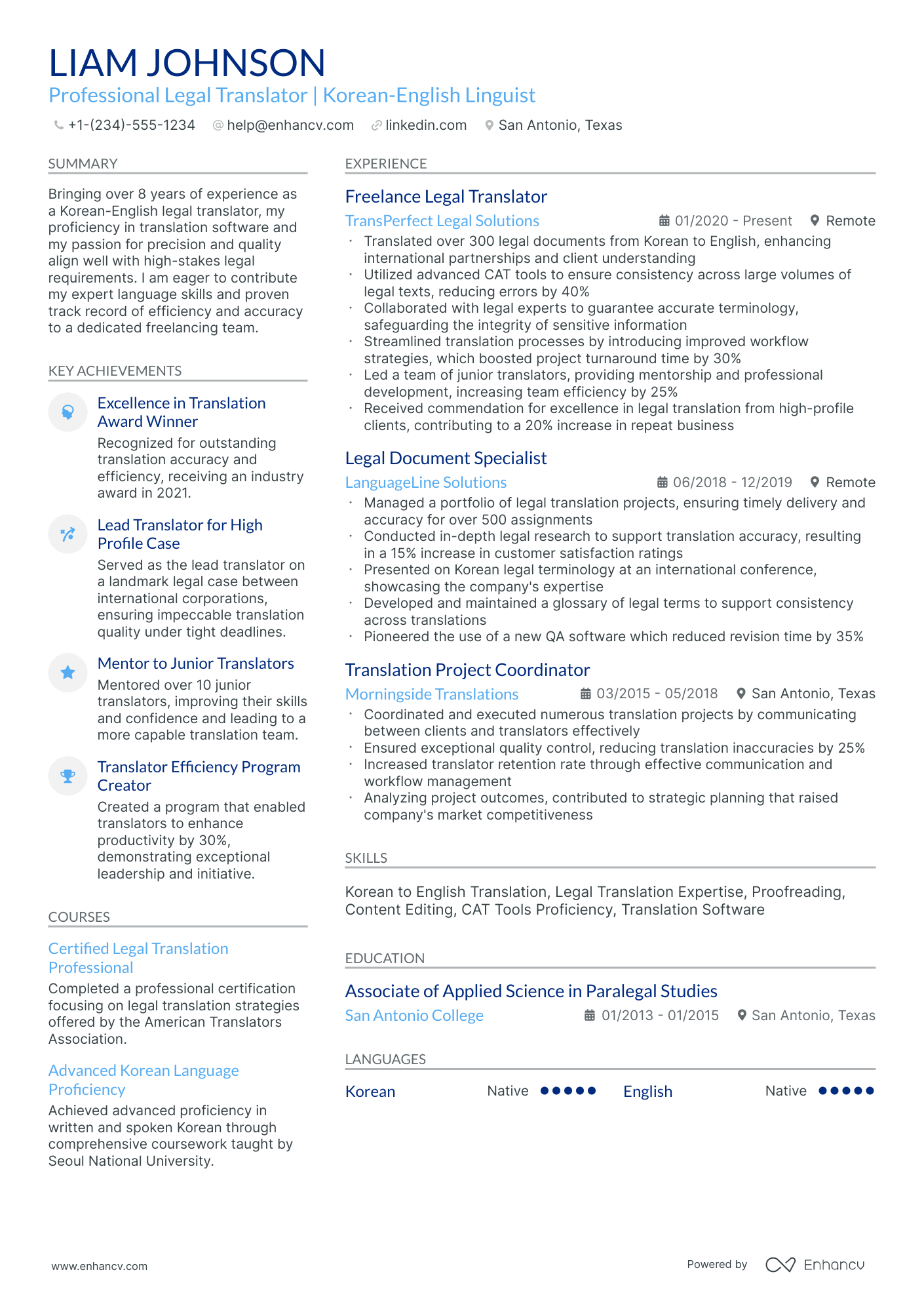As a legal translator, one resume challenge you may encounter is effectively showcasing your specialized language skills alongside your understanding of legal terminology and concepts. Our guide provides targeted advice on how to balance these competencies, giving you the tools to create a resume that highlights your expertise in both areas.
- Get inspired from our legal translator resume samples with industry-leading skills, certifications, and more.
- Show how you can impact the organization with your resume summary and experience.
- Introducing your unique legal translator expertise with a focus on tangible results and achievements.
If the legal translator resume isn't the right one for you, take a look at other related guides we have:
- Assistant Front Office Manager Resume Example
- Front Office Manager Resume Example
- Tax Preparer Resume Example
- Dental Administrative Assistant Resume Example
- French Translator Resume Example
- HR Administrative Assistant Resume Example
- Construction Office Manager Resume Example
- Administrative Manager Resume Example
- Guest Services Manager Resume Example
- Medical Administrative Assistant Resume Example
Simple guide to your legal translator resume format and layout
Successful legal translator resumes all have one specific characteristic - candidates have invested in a simple resume layout . One that is easy to read, makes a good first impression, and is adapted to their professional experience. There are three distinct resume formats to help you focus on your:- professional experience - use the reverse-chronological resume format;
- skills and achievements - via the functional skill-based resume format;
- both experience and skills - with a hybrid resume format .
What is more, keep in mind that your resume may be initially assessed by the ATS (Applicant Tracker System) (or the software used by companies in the hiring process). The legal translator resumes that suit the ATS:
- have a header that includes either a role keyword or the job you're applying for;
- should be no longer than two pages;
- be submitted as PDF, unless specified otherwise.
Upload & Check Your Resume
Drop your resume here or choose a file. PDF & DOCX only. Max 2MB file size.
PRO TIP
List your educational qualifications and certifications in reverse chronological order.
Legal translator resume sections to answer recruiters' checklists:
- Header to help recruiters quickly allocate your contact details and have a glimpse over your most recent portfolio of work
- Summary or objective to provide an overview of your career highlights, dreams, and goals
- Experience to align with job requirements and showcase your measurable impact and accomplishments
- Skills section/-s to pinpoint your full breadth of expertise and talents as a candidate for the legal translator role
- Education and certifications sections to potentially fill in any gaps in your experience and show your commitment to the industry
What recruiters want to see on your resume:
- Specific legal terminology proficiency and understanding of legal jargon in both the source and target languages
- Detailed knowledge of legal system structures and documentation of the countries for which the languages apply
- Accreditation or certification from recognized translation or legal translation institutions
- Experience with various legal document types such as contracts, patents, court documents, and corporate bylaws
- Confidentiality and ethical understanding crucial for handling sensitive legal information
Creating your legal translator resume experience to catch recruiters' attention
Remember that for the legal translator role, hiring managers are looking to see how your expertise aligns with their requirements. Here's where your resume experience section can help out. Make sure you:
- Include mainly roles that are relevant to the legal translator job you're applying for;
- Don't go too far back in your experience - recruiters will only care what you did a decade ago if it's really important for the legal translator role;
- Each bullet you include should say what you did, followed by the skills you used and the actual end result of your efforts;
- Quantify each of your achievements with numbers and possibly the overall effect it had on the organization;
- Highlight transferrable skills - or personal skills you've attained thanks to past jobs - that could be applicable within your potential workplace. This would showcase your unique value as a professional.
Formatting the experience section of your resume doesn't have to be an over-the-top deep dive into your whole career. Follow the legal translator resume examples below to see how industry-leading professionals are presenting their experience:
- Translated over 600 legal documents, including contracts, briefs, and patents, ensuring the use of precise legal terminology that matches the original intent of the documents.
- Managed a team of 4 junior translators, overseeing their work and providing mentorship, resulting in a 20% increase in team productivity.
- Developed a comprehensive glossary of legal terms to streamline the translation process for the entire department, significantly reducing turnaround time for project completion.
- Specialized in translating intellectual property and patent documentation, working closely with lawyers to ensure 100% accuracy in highly technical language translation.
- Led the translation services for a high-profile international lawsuit, which involved coordinating multiple language translators and strict adherence to legal frameworks.
- Implemented a peer-review system to enhance the quality of translated documents, subsequently reducing errors by 30% over a two-year period.
- Delivered simultaneous interpretation services for live court cases, maintaining high fidelity to the spoken word under stressful and rapid-paced conditions.
- Conducted legal research in foreign language databases to ensure accurate context and usage while translating documentation, contracts, and legal correspondence.
- Authored a monthly newsletter on translation best practices which was distributed company-wide and adopted by other departments to improve overall quality of communication.
- Established a successful freelance legal translation business, acquiring clients by networking and providing high-quality translations of legal documents such as depositions and evidentiary materials.
- Collaborated with international law firms to facilitate communication between parties, translating legal correspondence and ensuring cultural nuances were maintained.
- Increased client retention rate by 25% through meticulous work and by providing additional services such as localized legal content adaptation.
- Assisted in the creation of a digital translation workflow, reducing document processing time by 40% while ensuring confidentiality and security of sensitive legal information.
- Provided expert translation for immigration law cases, playing a pivotal role in the clear understanding and compliance with complex immigration guidelines and requirements.
- Worked extensively on document review projects for mergers and acquisitions, facilitating the due diligence process by ensuring thorough comprehension of all legal materials.
- Expertly translated and localized a suite of contractual templates for international use, which was adopted as the standard by a global law firm.
- Spearheaded the training of the firm's in-house translation software, contributing to a 15% increase in translation accuracy for junior staff.
- Played a key role in interpreting during corporate negotiations that resulted in successful deals across Latin America and European markets.
- Efficiently managed urgent translation projects with tight deadlines, delivering ahead of schedule and with high client satisfaction rates.
- Provided translation services for landmark class-action lawsuits, requiring strict attention to detail and knowledge of specialized legal concepts.
- Initiated cross-departmental collaboration with the localization team to tailor legal content for specific international audiences without losing the intended legal impact.
- Implemented a novel terminology management approach that improved the consistency of legal translations agency-wide by 35%.
- Directly worked with government legal departments to translate and localize new policies and regulations for international dissemination.
- Crafted a series of whitepapers on the intricacies of legal translation in the financial sector that were widely appreciated in industry forums.
- Collaborated on a multi-year project translating international trade agreements, facilitating global business operations and ensuring full compliance with all legal norms.
- Streamlined translation processes for legal case files by integrating advanced CAT tools, which improved project turnover rates by 22%.
- Provided vital translation expertise during client interviews and discovery sessions, markedly enhancing the quality of bilingual communication between attorneys and non-English speaking clients.
- Participated in an intensive training program to specialize in legal terminologies related to maritime law, substantially broadening the range of services offered to clients.
- Consistently delivered high-quality translations of court decisions and legal rulings, resulting in a high rate of client satisfaction and repeat business.
- Contributed to a team that translated over 5000 pages of pre-trial discovery documents, which played a crucial role in the preparation for complex litigation cases.
Quantifying impact on your resume
- List the number of legal documents translated over a specific period to exhibit work volume and consistency.
- Include the variety of languages you are proficient in, showcasing your linguistic diversity.
- Mention the percentage of on-time project deliveries to highlight reliability and time management skills.
- Specify the types of legal documents specialized in, such as contracts or patents, to demonstrate expertise.
- Quantify the number of words or pages translated to provide a scale of project sizes tackled.
- State the number of clients or projects managed simultaneously to show organizational capabilities.
- Highlight any increase in the translation accuracy rate after your revisions to reflect quality improvements.
- Measure the reduction in translation turnaround time achieved through your efficiency to indicate process optimization.
Action verbs for your legal translator resume
Guide for legal translator professionals kicking off their career
Who says you can't get that legal translator job, even though you may not have that much or any experience? Hiring managers have a tendency to hire the out-of-the-blue candidate if they see role alignment. You can show them why you're the best candidate out there by:
- Selecting the functional skill-based or hybrid formats to spotlight your unique value as a professional
- Tailoring your legal translator resume to always include the most important requirements, found towards the top of the job ad
- Substituting the lack of experience with other relevant sections like achievements, projects, and research
- Pinpoint both achievements and how you see yourself within this specific role in the legal translator resume objective.
Recommended reads:
PRO TIP
Listing your relevant degrees or certificates on your legal translator resume is a win-win situation. Not only does it hint at your technical capabilities in the industry, but an array of soft skills, like perseverance, adaptability, and motivation.
Popular legal translator hard skills and soft skills for your resume
Apart from assessing your professional expertise, recruiters are on the lookout for whether your skills align with the job.
Your profile would thus be assessed in regard to your:
- Hard or technical skills - your ability to perform on the job using particular technologies or software
- Soft skills - how you adapt, communicate, and thrive in different environments.
Both types of skills - hard and soft skills - are important for your resume, so make sure to create a dedicated skills section that:
- Lists up to five or six skills that align with the job advert.
- Integrates vital keywords for the industry, but also reflects on your personal strengths.
- Builds up further your skills with an achievements section within which you explain what you've achieved thanks to using the particular skill.
- Aims to always quantify in some way how you've used the skill, as it's not enough to just list it.
What are the most sought out hard and soft skills for legal translator roles?
Check out the industry's top choices with our two dedicated lists below:
Top skills for your legal translator resume:
Proficiency in legal terminology
Translation software (CAT tools)
Document management systems
Research databases
Text editing software
Terminology management tools
Proofreading techniques
Legal citation formats
Language-specific legal resources
File conversion tools
Attention to detail
Analytical thinking
Time management
Cultural competence
Communication skills
Problem-solving abilities
Adaptability
Organizational skills
Interpersonal skills
Confidentiality and ethics
PRO TIP
Highlight any significant extracurricular activities that demonstrate valuable skills or leadership.
Listing your education and certifications on your legal translator resume
Don't underestimate the importance of your resume education section . As it may hint at various skills (and experience) that are relevant to the job. When writing your education section:
- Include only higher education degrees with information about the institution and start/end dates
- If you're in the process of obtaining your degree, include your expected graduation date
- Consider leaving off degrees that aren't relevant to the job or industry
- Write a description of your education if it presents you with an opportunity to further showcase your achievements in a more research-focused environment
When describing your certifications on your resume, always consider their relevancy to the role. Use the same format to describe them as you would for your education. If you're wondering what the best certificates out there are for legal translator roles, check out the list below.
The top 5 certifications for your legal translator resume:
- Certified Translation Professional (CTP) - Global Translation Institute (GTI)
- American Translators Association (ATA) Certification - American Translators Association
- National Association of Judiciary Interpreters and Translators (NAJIT) Certification - National Association of Judiciary Interpreters and Translators
- Chartered Institute of Linguists (CIOL) Qualifications - Chartered Institute of Linguists
- Diploma in Translation (DipTrans) - Chartered Institute of Linguists
PRO TIP
Highlight any significant extracurricular activities that demonstrate valuable skills or leadership.
Recommended reads:
Your legal translator resume top one third: choosing between a resume summary or an objective
The top third of your resume is crucial, as recruiters might focus only on this section rather than reading the entire document. Therefore, it's important to carefully decide whether to include a resume summary or an objective.
- The resume summary encapsulates your most significant experiences, key achievements, and skills in the field. Ideal for candidates with substantial relevant experience, the summary previews what recruiters will find in the rest of your resume.
- The resume objective outlines your professional aspirations. It describes your career goals for the coming years and how you envision your role evolving in the prospective company. The resume objective is suitable if you have less professional experience and wish to emphasize various soft skills such as motivation, vision, and planning.
Explore some of the best examples of resume summaries and objectives from real-life professional resumes in the industry.
Resume summaries for a legal translator job
- Seasoned legal translator with over 12 years of experience, proficient in Spanish, English, and French. Successfully facilitated multilingual litigation support for prominent international law firms, accurately translating complex legal terminology. Recognized for outstanding precision and awarded ‘Translator of the Year’ by the International Translation Association.
- Dedicated multilingual legal professional pivoting from a 10-year career as a corporate lawyer into legal translation. Brings an in-depth understanding of legal documents and procedures, coupled with fluency in German and English. Instrumental in negotiating cross-border mergers, ensuring flawless translation of contractual obligations.
- Former forensic linguist eager to transition to legal translation, offering a robust analytical skill set and proficiency in Arabic, English, and Italian. Excelled in deciphering ambiguous language in high-stakes criminal cases and is now keen to apply that meticulous attention to detail to translating authoritative legal documents.
- Aspiring legal translator aiming to leverage a Bachelor's degree in legal studies and a passion for language acquisition. Eager to develop expertise in translating legal documents while supporting international legal proceedings. Committed to mastering legal terminology in multiple languages and contributing to effective international communication.
- Recent law graduate inspired to specialize in legal translation, bringing forth strong research skills, a deep understanding of civil law, and fluency in Mandarin and English. Ambitious about playing a pivotal role in bridging language barriers within the legal domain, facilitating clear and accurate cross-cultural communication.
- With an impressive track record spanning 15 years, this legal translation expert specializes in Italian and Russian. Excelled in creating comprehensive bilingual legal dictionaries for reputable law firms and takes pride in enhancing the accessibility of legal materials for non-native speakers.
Extra legal translator resume sections and elements
Creating a winning legal translator resume isn't about following a rigid formula. The key is to tailor it to the job requirements while maintaining your unique personality.
Consider including these additional resume sections to enhance your profile:
- Awards - Highlight industry-specific awards as well as any personal accolades to demonstrate recognition of your expertise and achievements;
- Hobbies and interests - Share your interests outside of work. This can provide insights into your personality and indicate whether you'd be a good cultural fit for the organization;
- Projects - Detail significant projects you've been involved in, focusing on your contributions and the outcomes;
- Publications - If you've authored or co-authored academic papers or other publications, include them to establish your credibility and in-depth knowledge of the field.
These sections can give a more comprehensive view of your capabilities and character, complementing the standard resume content.
Key takeaways
- The format and layout of your legal translator resume should reflect on both your career and what matters most to the job you're applying for;
- Use the resume summary and objective to hint at your most prominent accomplishments;
- Always be specific about your experience and consider what value each bullet you curate adds to your legal translator application;
- Consider how your academic background and technical capabilities could further showcase your alignment to the role;
- Your soft skills should contribute to your overall legal translator profile - aligning your personality with skills and results.
